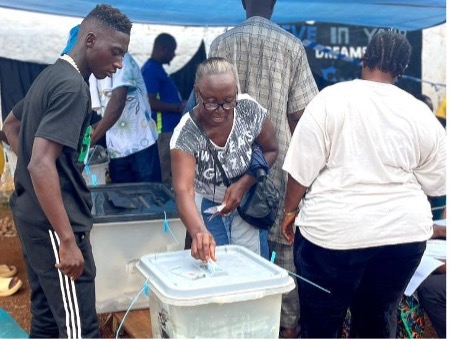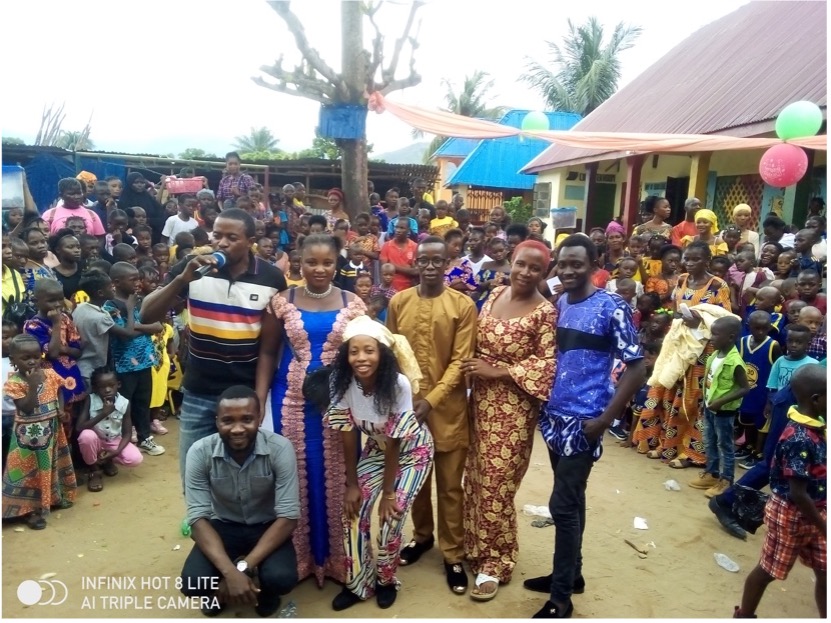Latest Updates
Sierra Leone: Women’s Electoral Participation

Gender Insights from Sierra Leone’s General Elections
The recent elections in Sierra Leone, held on 24th June, brought both progress and challenges to the forefront. Sierra Leone has made efforts to promote gender equality through legislation mandating that women hold 30% of all positions in both the public and private sectors, including parliament. An impressive 877 individuals ran for parliamentary seats among whom 32 percent of the parliamentary candidates were women. However, observers indicated that the next parliament was unlikely to meet this requirement as insufficient numbers of women were placed in prominent positions on candidate lists. Notably, among the 13 presidential candidates, only one womanemerged.
Promoting gender equality in politics is not only a matter of social justice but also crucial for inclusive governance and sustainable development. While Sierra Leone has witnessed some progress, further action is needed to enhance women's participation and amplifying their voices in shaping policies.
New Gender Equality and Women’s Empowerment Bill Introduced
February 28, 2023
At the end of January, the President of Sierra Leone, Julius Maada Bio, signed the Gender Equality and Women’s Empowerment Act into law which aims to improve women’s access to finance, more positions in employment, and to link government spending to improving gender equality. The Act ensures that 30 percent of parliamentary seats and cabinet positions are held by women and is a great win and a big leap in the advancement of women in governance and leadership in Sierra Leone.
Currently in Sierra Leone, with a population of almost eight million people, just 19 percent of local politicians are women, and only 13 percent at national level. However, with women’s quota, significant changes are to be expected in the June 2023 presidential, parliamentary, mayoral, and local council elections.
Women's Political Participation in Sierra Leone

While women account for 52 percent of the total population in Sierra Leone, they occupy less than 20 percent of elected positions. Their voice, visibility, participation, and representation in elective and appointment positions remain insignificant compared to men. Some of these challenges include lack of economic independence, high illiteracy and entrenched customs and traditions, political violence and reprisals, the absence of progressive laws that protect and promote effective participation for women, and the lack of confidence to vie for public positions. In Sierra Leone, women are at risk for sexual and gender-based violence in the form of domestic violence, sexual assault of adults and minors, marital rape, school-related sexual abuse, and harmful traditional practices like female genital mutilation.
Many women organisations are addressing the issues like high rate of early marriage, teenage pregnancy, genital mutilation, and gender inequality working towards reducing girl illiteracy preparing them to have their voices heard and be engaged in decision-making processes. International community needs to support women and women’s rights organizations in Sierra Leone, especially in the area of their political participation in relevance with the upcoming elections.
The Political Situation in Sierra Leone and Upcoming 2023 Elections
Sierra Leone is a constitutional republic, its consists of a multi-party system and has two main political parties, which are, the Sierra Leone People's Party (SLPP) and the All People's Congress (APC). In 2018, Sierra Leone conducted presidential and parliamentary elections which resulted in a peaceful transfer of power from one political party to another and it also contributed to consolidation of the country's commitment to democracy. In other words, in March 7th 2018, the opposition Sierra Leone People's Party (SLPP) presidential candidate, Julius Maada Bio, narrowly won the presidential elections with Popular vote of 1,319,406 (51.8%) as against Dr Samura MW Kamara, the presidential candidate for the All People's Congress (APC) with a popular vote of 1,227,171(48.2%). In addition, both the president and members of Parliament are elected for a period of five-years term.
The Parliament of Sierra Leone is unicameral legislature, with 146 seats. Each of the country's sixteen districts is represented in parliament. 132 members are elected concurrently with the presidential elections; the other 14 seats are filled by paramount chiefs from each of the country's fourteen administrative districts. Out of the146 seats, (132 elected + 14 appointed). Below is the composition of Political parties, the All People's Congress won (68), the Sierra Leone People's Party won (49), the Coalition 4 Change won (8), the National Grand Coalition (4), Independents (3) and finally the appointed Paramount chiefs got (14 seats). It is ideal to also note that, the members of Parliament of Sierra Leone are addressed as Honourables.
The Political Parties Registration Commission (PPRC)
There is another significant independent body called the Political Parties Registration Commission (PPRC), made up of four members chosen by the president. The PPRC Act No3 of 2002 gives the Commission the mandate to:
1. Register and supervise the conduct of political parties in accordance with the 1991 Constitution and the Political Parties Act of 2002;
2. Monitor the affairs or conduct of political parties to ensure compliance with the constitution of Sierra Leone, the Political Parties Act, and the terms and conditions of their registration;
3. Monitor the accountability of political parties to their membership and to the electorate of Sierra Leone;
4. Promote political pluralism and spirit of constitutionalism among political parties;
5. When approached by persons or parties concerned, to mediate any conflict or disputes between or among the leadership of any political party or between or among political parties;
6. To do all such things as will contribute to the attainment of good conduct of political parties.
The 2023 Elections in Preparation
Quite recently, the Chief & Chairperson of the national electoral commission of Sierra Leone, Mr Mohamed MN Konneh announced that the upcoming elections would hold on the 4th June, 2023. Therefore, the voter registration process commenced on the 3rd September to 4th October 2022, consecutively, and the voters must be 18 years or older and of sound mind the reason being, the voting system is done by secret ballot.
He further stated that, the voter registration process would be in two phases. Each phase takes 15 days and at every phase, the designated registration centers would be opened at 07 a.m. and closed at 5p.m across the country in every constituency and ward. The first phase started on 3rd September and ends on 17th September, 2022. This is first in the history of Sierra Leone, for a voter registration process to split into two phases. This sounds unprofessional on their part and it stands a test of their integrity, regarding a free, fair and credible conduct of elections 2023.
He also mentioned that, the commission would need two days to mobilize equipment and staff across the country to start the 2nd phase on 20th September and ends on 4th October 2022. But he has just made an extension of tow day more to revisit the first phase centres on the 7th and closed the 8th October, 2022. Despite a good number of people were unable to register due to faulty computers and deliberate refusal to register eligible first voters, especially girls/women. In several centres in the capital city of Freetown, voters queued up for many hours waiting to register, only to be told by officials that, they were experiencing technical problems. Other centres in the north, east and south of the country experienced similar problems for this year's voter registration.